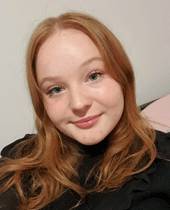Microbiology in Industry: Eloise Nelson’s week at GSK Ware
Hi, my name is Eloise, an undergraduate MSci Biomedical Sciences student at Newcastle University and a Microbiology Society Champion! I’m interested in antimicrobial resistance and fungi.

GSK: Pioneering Global Healthcare
GSK is well known for its commitment to improving quality of life by producing groundbreaking vaccines for malaria and shingles and dedicating itself to the fight against HIV/AIDS and antimicrobial resistance. I had the incredible opportunity to visit GSK Ware, one of the company’s few combined research and development (R&D) and manufacturing sites, set by a picturesque river. They specialise in respiratory devices for chronic obstructive pulmonary disease (COPD) and asthma patients and HIV medicines in oral solid dose form.
During my visit (kindly and effectively arranged by Mark Nelson, a manufacturing coordinator and also my amazing Dad!), I saw the manufacturing line for respiratory devices and HIV tablets – from micronising, where active pharmaceutical ingredient (API) particles are reduced to suitable sizes for packing. Something I admired about the manufacturing teams was their commitment to cooperation and effective communication. Each department had a great appreciation for the other, passionate about ‘providing patients with the highest quality medicine’.
Microbiology in an industrial setting
I visited the operational quality department, where the patient-focused values of GSK shone through. I witnessed the processing of corrections and trouble-shooting, learnt of the electronic systems used and Standard Operating Procedures (SOPs). I also spoke to qualified personnel who sign off on drug batches to be sent to patients, bearing legal responsibility. Whilst at the R&D site, I spent the day with the microbiology team in their environmental monitoring lab, linked to the R&D pilot plant. This was particularly special, as I had always wondered what microbiology could look like in an industrial setting and how labs are integrated into the wider company.
I saw the team take samples of equipment storage/cleaning rooms after a full clean to ensure the process was completed effectively with no risk of contamination. Their main concerns were regarding Staphylococcus aureus and Escherichia coli for equipment and tablet sampling and Pseudomonas aeruginosa for water testing samples. Whilst there, I did some lab work to identify preprepared cultures and saw their electronic lab book where tests were logged with corresponding batch numbers. I completed a Gram stain, catalase and coagulase test, eventually deciding the culture in question was S. aureus. It was thrilling to be hands-on in a professional lab, seeing a day in their lives!
I learned that environmental monitoring is more involved than I expected. It directly impacts quality control, ensuring GSK produces medicines of the right quality for patients. The microbiology team has regular meetings with the quality control department regarding each drug they are responsible for, reporting findings and collaborating across the multidisciplinary team to streamline standard operating procedures. Seeing a department focusing on microorganisms, compared to departments using kilograms of bulking agent, felt very surreal and showed me the consideration that goes into producing medicines.
My week as a whole and what I learnt
I met many talented individuals, including prominent women, who shared their career paths. I learned a lot about how GSK's supports female development and the company's diverse culture.
It was an incredibly busy week, and I was in awe of everything I learned. Initially, I felt a bit nervous about meeting so many people. However, I quickly realised that networking isn't that scary when you share common passions. My advice for anyone in a similar situation is to write down your learnings at the end of each day, track how your perspective has changed and to ask lots of questions!
During my visit, I had the privilege of meeting the Site Director, Steve Burgess, who spoke about the site’s future and his career journey. The site is hoping to expand its capabilities, with a strong focus on cutting-edge technologies and sustainable practices aligning with GSK’s global vision. Our conversation felt symbolic of the essence of GSK, where science and leadership intersect to drive impactful change. Overall, my week was eye-opening, giving me a deeper appreciation for the work done to advance healthcare on a significant scale.
